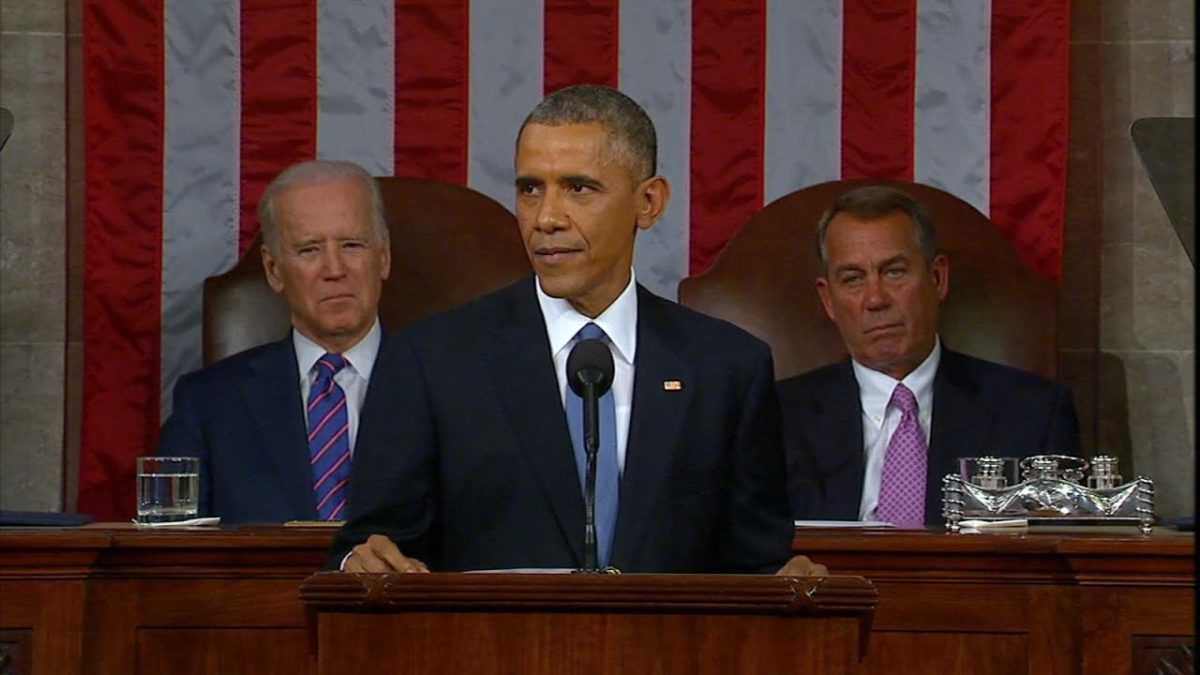From Selma to the State of the Union

Yes, the economy is growing, but for whom? Given the resources in the U.S., everyone could easily be guaranteed a decent standard of living.
Last night President Barack Obama called for a better politic and claimed that “tonight we turn the page,” all while insisting that “a brighter future is ours to write.” He laid out several liberal – if not entirely innovative – ideas and strongly embraced a “middle-class economics” (notably failing to mention poverty directly) that included support for everything from publicly subsidized child care to higher education, and a call for raising the floor on wages. And he did so while being fairly sure that, given a Republican-controlled Congress, he was in no position to deliver most, if any, of his new agenda. As a result, the media described the speech as a President who has “come out swinging” to “frame the debate.”
Given the extreme inequality we face today, and the hardship the growing number of people in the United States are facing in their struggle to meet even the most basic needs, it is hard to quibble with any effort to change the debate. I might disagree with the assertion that the “shadow of crisis has past” for most people. I might also feel that we can do more than give families “a fair shot” or an “opportunity” for a decent life. Given the vast resources in our country, we can easily guarantee that every family has a decent standard of living. But these are not the central issues that arise from President Obama’s speech.
From the film Selma, which has engendered public debate about the role of President Lyndon B. Johnson in the Civil Rights Movement, to last night’s State of the Union, the more central question underlying the debate is who can write this brighter future? Although the president stayed away from talking about rights, many of the issues the president referred to last night touched on basic human rights to which every person is entitled – health care, housing, education, a decent job, and an adequate standard of living (given the levels of hunger in this country, food was a glaring omission). And it is no longer a secret that the United States has a dismal record in ensuring these rights equitably to all people within its borders.
Yes, the economy is growing, as the president noted, but for whom? While employment is up, wages are still depressed, many families still go hungry, and housing costs are oppressive. One million children, mostly of color, get pushed out of school each year and do not graduate, sent into a ruthless economy without much of a chance of securing a decent life. We may be “humbled and grateful” for veterans as the president noted, but we still allow skyrocketing levels of homelessness among veterans and fail to provide adequate healthcare when they return.
History tells us it is not a president, nor even a Congress, that is likely to change this dismal landscape. As Selma chronicles so beautifully, it was a movement demanding radical change that led to President Johnson’s call for civil rights, which are of course part of the human rights to which we are all entitled. We may debate whether President Johnson was supportive or skeptical, but what is imminently clear is he did not lead or catalyze the change. And while, many may say Obama demonstrated his true politics last night, lets not forget that – in response to external pressures – it was President Richard Nixon that ended hunger, and President Bill Clinton that ended welfare for many of our most vulnerable families. Any President’s politics can all too often more resemble a shape-shifter than a principled vision.
Despite the fact that what President Obama laid out last night was far from a transformative vision or a genuine and tangible policy such as the New Deal, today, it is also our social movements’s demands – for raising the minimum wage, for healthcare justice, for quality education, and more – that we heard watered-down echoes of in the president’s speech. Indeed, one of Obama’s signature initiatives, “My Brothers Keeper,” is the result of the many youth and parent groups across the country who have fought school pushout, racially targeted harsh discipline, and zero-tolerance policies deployed against youth of color, rather than a product of a presidential agenda. This simply demonstrates that we have laid the needed seeds of change, and we must continue to grow the movements to realize their vision.
A president may seem powerful or weak, depending on the political moment, just as a Congress may seem able to govern or paralyzed. But the change we need has never come out of Washington, D.C. This is particularly true in our moments of greatest and most needed change. President Franklin D. Roosevelt responded to the labor movement in his proposals for a New Deal in a context that went far beyond framing the debate (although they were half-measures in light of the demands of the movement), just as President Johnson was responding to the demands of a powerful Civil Rights Movement. As we debate the significance and potential impact of last night’s State of the Union, let us remain keenly aware of who actually generates change in our country and who the champions of our human rights have always been. And then let’s re-commit to building the strong social movements that can write a brighter future and drag the political establishment along with it.
Posted originally published on TeleSur
